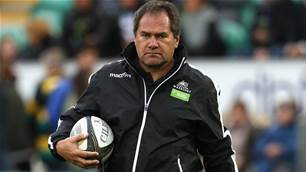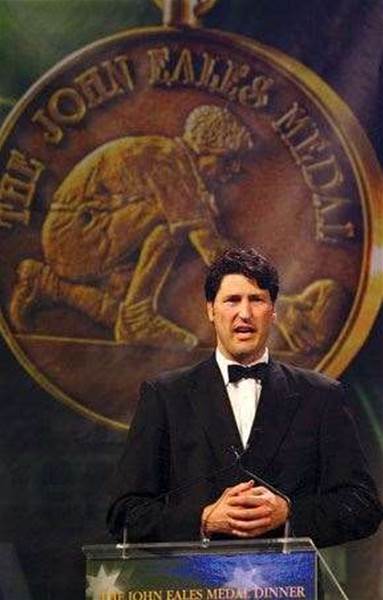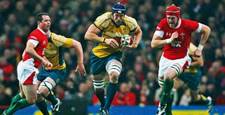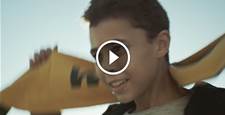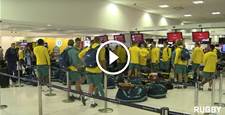Eales’ reputation is arguably the most unblemished of any sportsperson in Australia in the last two decades.
Eales’ reputation is arguably the most unblemished of any sportsperson in Australia in the last two decades.
John Eales’ numbers actually reveal a good part of his story. In his decade representing Australia he collected 86 caps, 55 as captain. He played 112 times for Queensland. He scored 173 points for the Wallabies, with just two tries among that total, the rest coming off his excellent boot, which makes him the highest-scoring forward in Test rugby history. He was an integral part of the Wallabies’ two World Cup successes, first as a newbie lineout jumper in 1991, then as skipper in 1999. But what the stats can’t convey is his character as a player, which he has since parlayed into his business life: Eales’ reputation is arguably the most unblemished of any sportsperson in Australia in the last two decades. He confronted the most fearsome of opponents in the most physical of sports, but navigated his way through his career with impeccable class and without so much as a single besmirching slip of the tongue. Witha psychology degree behind him and intimate understanding of the qualities of successful leadership and team culture, he has seamlessly entered the business world since his retirement from play in 2001, now consulting and teaching at the top end of town through his role with Chandler Macleod, along with numerous advisory and ambassadorial roles with various sporting organisations, including a place on the board of the Australian Rugby Union and a role as athlete liaison officer for the Australian Olympic Committee, which will see him ensconced with the Australian team in London next month. An author of two books relating to sport, business and leadership, a devoted family man domiciled in Sydney, always diplomatic, invariably thoughtful and considerate, invariably interested and interesting, he was a natural choice to revisit with Scotland and Wales Tests approaching this month and the Games just around the corner.
I know you’re teaching a lot these days ... Are you still learning?
I’m always still learning. I’m actually in the process of doing a company director’s course, but learning is so important. Reading is so important. The great thing about working in business and some of the consulting things I do is that you have great exposure to different leaders and people who are achieving across a breadth of industry, so you have to be reading things.
What sort of books are we talking about – the Outliers and the Black Swans of the world?
I’ve read both those – I’ve read a lot of (Malcolm) Gladwell’s stuff. One of my favourite authors is Michael Lewis – I know he’s become very trendy of late with Moneyball, but it’s over ten years old and I read it a long time ago. Liar’s Poker I think was his first book which was almost autobiographical, about his time in the financial markets. I’ve read all his books.
That’s the genre that most interests you, then? The art and science of exceptional human performance?
Yeah – you capture it well there. I’ve always really respected the power of a story. Like when you’re building a team that’s had success, like a rugby team, for example, that success was sometimes born of the stories of a failure, or the stories of the individuals who came into the team and how they fit in, and that all becomes part of the story and the culture of that team. Those authors are really great storytellers first. I don’t purport to be up there with those guys, but I always knew my books had to be about education through entertainment. Education has always been really important in our family – understanding its value and people who can educate. And you learn that through many different walks. I remember when John Muggleton first came into the Wallaby team, the first coach from a defensive point of view. Defence in rugby was so archaic before he arrived: it was mainly like, “There’s ten tackle bags – you’ve got to go up and back ten times and tackle them.” John brought not only science to defence but also art, and the art was in how he educated us about it, because he was a teacher. I’m not saying all rugby coaches need to be great teachers, or that all teachers make good rugby coaches, but all great rugby coaches are great teachers. Not necessarily by qualification, but by trade.
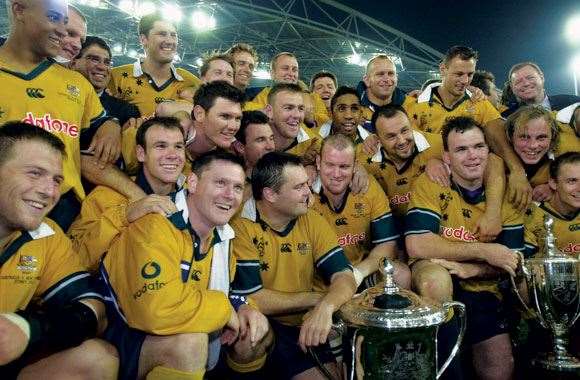 photos by Getty Images
photos by Getty ImagesI last saw you in a photo at the World Track Cycling Championships in Melbourne, standing next to the great Anna Meares in your role with the Olympic team ... What do you actually do?
It’s a great role. Peter Montgomery and John Coates gave me the opportunity to do it in Athens. They used to have these “Winning Attitude” seminars, and they’d have people from outside the Olympics and Olympic sport come and speak to the potential athletes in group sessions. Herb Elliott started it – he was the first liaison officer with Dawn Fraser in 1996. Then Peter Brock came in to Sydney. Then it was myself, Russell Mark, Peter Brock and Robyn Maher in Athens, and then Steve Waugh came in for Beijing, and at this Olympic Games coming up it’s going to be Layne Beachley, Steve Waugh, Kieren Perkins and myself. And Laurie Lawrence is this kind of roving ...
Team mascot?
Yeah. It’s a great role, it’s not particularly structured, but they assign us to different teams ... Cycling is one of my teams. I always try to meet them and spend a little time with them before the Games ... But then I tend to try to just carry the drinks or push the bags around or whatever it might be.
I imagine it proves a bit more involved than that at times. Is it your mere presence that has this calming effect? Have you felt like you’ve been really useful before?
Yeah, I have ...You’re there as a support. I don’t push myself on to people. It’s just important to be there – I don’t assume that my presence has any impact at all. But if you’re there, people are more inclined to come up and have a chat, and, you know, at times those chats have been, generally speaking, like, “Hey, I just won a gold medal, how do I protect myself? What do I need to do now?”
I thought your role was more pre-performance ...
Most of it is. You’re there to help in preparation. It might be a coach coming up to you and talking about a team dynamic, or a captain ...
Problems obviously do arise from time to time?
Yeah. They might approach and ask, “We’ve got two big games in a row, what sort of things can we do to prepare ourselves?” A whole gamut of issues.
What’s more important there? Is it the example of your playing career, or is it your psychology degree?
Probably a hand in each bucket. I think the psychology degree more than anything else taught me how to structure my thinking.
Did you ever feel like you were a kind of closet shrink when you were captaining the Wallabies?
I couldn’t say I was drawing from Freud or Hans Eysenck or whoever it might’ve been, but I think we’re all a product of our experiences. I actually learned more about psychology from some of the great coaches I had, about dealing with people.Because, at the end of the day, I think in all those roles it’s more about how you deal with people and manage personal relationships and team dynamics, and you learn more from participating.
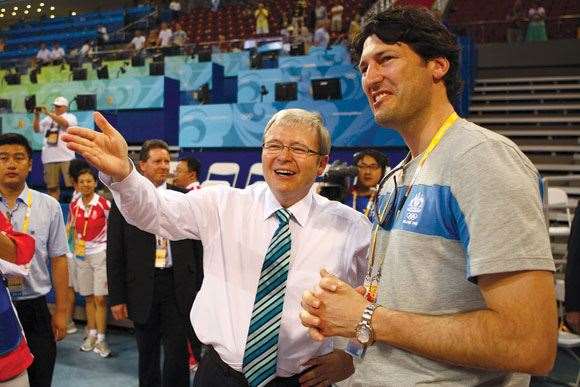 photos by Getty Images
photos by Getty ImagesDo teams have to like each other to play well?
Not really, funnily enough. I think there can be a lot of competitive tension – there can even be quite open dislike between people – as long as they’re united in a cause. So liking is not important, but uniting is. I think any team’s like that, whether it’s business or sport. There are some more natural bonds that do develop when you do like each other; if I think of the great teams I was a part of, most people at least liked each other. Some teams have a lot more good feeling, but I don’t think it’s a prerequisite.
That’d be a message you could take into the business world, too, wouldn’t it?
Oh yeah. There’s an awful amount of selfishness in business, as there is in sport. People do think from their own perspectives first, but what you do need to do is fight to make sure the selfishness that we all have – ambition, call it what you will, it can have many different titles – doesn’t overtake the selflessness you need to be a part of a team.
Sport has been used for a while now to educate the business world, but now it seems to be coming back the other way a lot, with corporate thinking governing the organisation of footy teams. Is that always a positive thing?
Rod Macqueen was very big about bringing business principles into the (Wallaby) team, and there’s no doubt that what took us ahead were some of the rigours that he introduced. But they’re just different terms for some of these things. There are similar foundations in sport and business or in life. And the terms you use for them go through fashions ...
What is it about the term “composure” and the sport of rugby union? It’s a concept rather heavily worked over in the lexicon of the game ... As if the only reason a team wins is because they have composure, or lose if they don’t have it ... What does it actually mean? Is it just an absence of panic at pressure points in a game?
Composure is the result of getting a lot of things right – you can’t just declare that we’re going to be a composed team. I think it’s clarity in the moment, but you don’t get that clarity unless you’ve gone through the routine. A lot of people will say, “Oh, he’s a great instinctive player and creates a lot of things.” Now, a sport like rugby lends itself to individual brilliance. But unless there’s structures there to give a chance for that individual brilliance to shine, it won’t happen, and part of being able to capitalise on those big moments is being composed. It’s about having a routine you can go back to.
Like a mental routine? ... Like what went through your head before a kick?
Ben Perkins was my kicking coach. I created my routine myself, but he would reinforce the importance of being yourself in those moments,
and so for me it was about having a routine in which I could be myself. So you could actually retreat to the sanctuary of that routine when you had the pressure moments. And for me it was just place the ball, make the decision of where you’re going to aim for, three steps back, three steps across, head down, slow, and follow through to the posts.
And you’d say those things in your head?
I’d say head down, and I would actually pick a specific stitch on the ball to look at. Slow – I’d just remind myself to go slowly through the kick instead of rushing it. Follow through to the posts ... And then I’d say to myself: “The only thing that matters is the ball.” And so that routine would cut out all the pressure of the situation. I mean, you still feel excited and tense, but it would just bring you back to what’s important. So that to me is composure. And so you can train it. You build your routines – you can train it through your preparation, not being surprised by a situation. Even though you come across new things in sport, the more you can be excellent at the routines that repeat themselves, the more you’re going to react better to the things that are different.
Your career straddled the progression from amateur to fully professional. Did football become less fun once it became moneyball?
Not at all – in some ways it became more fun. Some people look back lovingly at the amateur era, but I don’t. I say they were equally as enjoyable. But the great thing about the professional era was that it gave you the opportunity to devote yourself to something you love doing. Like, I came through the time where you would go to the gym at 6am in the morning, go straight from there to the office, leave the office at 5.30pm so you could be at Ballymore at 6pm, and you’d leave Ballymore at 8.30pm or so at night, go home and get a feed (lucky I was living at home), then do it all again the next day, and that was really hard. And I wasn’t supporting anyone through that time. The tours were great, but it definitely became easier when it became professional. A lot of people will say that the personalities have disappeared from the game – the personalities are still in the game, they just express themselves differently ...
How did the body hold up after your career? Can you get out of bed without pain these days?
I probably have more aches and pains than if I didn’t play rugby, but then I might be diabetic or something like that. The shoulder I am aware of, because I had two full reconstructions – I can’t do heavy weights above my shoulders. But I don’t seek to really do heavy weights above the shoulder. But it doesn’t stop me doing anything, really ...
But you could’ve played longer, couldn’t you?
Physically I could’ve, yeah. I’d just had enough, really. I still enjoyed the playing, but I just wanted to do other things.
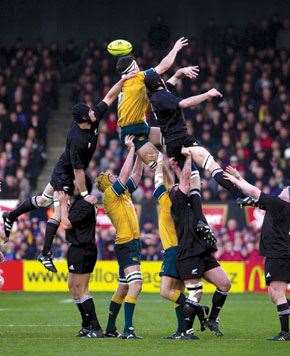 photos by Getty Images
photos by Getty ImagesI’ve heard you say before that you weren’t retiring from something, but you were retiring to something.
That’s one of (manager) Chris White’s sayings, actually, from International Quarterback. And it’s so right. I remember very early on in my career I was talking to an Irish person and they said you have to love what you do, not what you did. And that’s very similar: it’s about living in the present for the future, not about living in the past.
When New Zealand won the Rugby World Cup, did you think it was at all an okay thing?
I was sitting closer to the French than New Zealanders, so I felt their pain. But that’s been 24 years of pain and waiting in between for the Kiwis. But look, I felt very pleased for them. Richie McCaw especially is a guy who deserves to be in a World Cup-winning team. The one I felt sorry for was Dan Carter; he’s such a great player (injured during the tournament). But McCaw I felt very pleased for. If you think of the captains who have won World Cups, there has been no one better than him as a player over the length of the time he has been dominant. It would have been a shame if he hadn’t been remembered for that.
I don’t suppose it made you feel better than the Reds winning the Super 15 tournament last year?
That brought so much joy. It’s funny – there’s something very tribal about your provincial team and your club team. I never won a premiership with (club team) Brothers – we went through a very lean patch, so when Brothers eventually won it a couple of years ago for the first time in more than 20 years, that was a great moment, and it was similar when the Reds won. You invest so much emotion – they were my teams ... It’s a bit different for your country,
I think. They were the teams that you grew up watching and loving and wanting to be a part of. I saw them play more than anyone else ...
Is Australian rugby too diluted with the number of regional teams we have now?
I think it probably is at the moment, but it won’t be in a few years. At some point you have to get weaker to get stronger in a sense, and when the best players come through for Australia, we’ll have more people to pick from. We’ve gone through this before – it happened when the Brumbies were set up. You eventually get there.
Are we going to beat Scotland and Wales this month?
I hope so. The Welsh are a really attractive team at the moment – it’s always a difficult time for them to tour, just at it is for us to tour north. But they’ll be good games to watch. Scotland have proved very difficult for a lot of teams over the last couple of years – they didn’t have a great Six Nations, but Wales had a really impressive Six Nations. I’m hopeful it’ll be a great series. Winning it will be really important, but there should be some enterprising rugby. The Welsh – you don’t go to sleep watching this team.
‒ Graem Sims
Related Articles
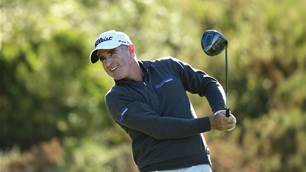
Video interview: Drinks With ... Matt Millar
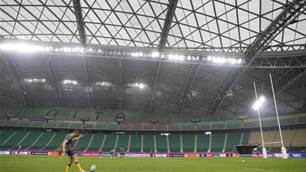
Wallabies looking for inspired performance in RWC quarter-finals
